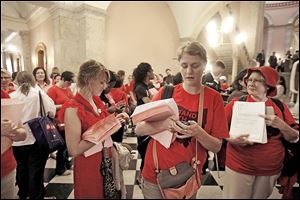
SUPPORTERS, OPPONENTS SQUARE OFF AT STATEHOUSE
Ohio Senate OKs $62B budget, tighter restrictions on abortions
6/28/2013
Opponents of a state budget bill that would impose more restrictions on abortions deliver 17,000 signatures to Gov. John Kasich’s office after a protest on the Statehouse steps Thursday.
COLUMBUS DISPATCH/TOM DODGE

Opponents of a state budget bill that would impose more restrictions on abortions deliver 17,000 signatures to Gov. John Kasich’s office after a protest on the Statehouse steps Thursday.
COLUMBUS — About 100 people opposed to proposed tighter restrictions on abortions chanted “line-item veto!” on the Statehouse steps Thursday shortly before lawmakers voted to send a proposed $62 billion, two-year budget to Gov. John Kasich’s desk.
And they shouted “Shame on you!” in the Senate when that vote was a done deal, then were quickly led from the chamber.
Mr. Kasich has line-item veto authority to strike language from the plan, but he can’t add anything. He’s already broken with some elements of the Republican Party to support expansion of Medicaid eligibility and refusing to sign on to a right-to-work bill. Protesters hope lightning will strike three times.
■ Adds $717 million in K-12 basic education subsides over two years above what schools received in current budget.
■ Exempts Toledo Mud Hens from paying sales tax and forgives past due tax bill of $553,389.
■ Allows local governments to meet privately to discuss business requests for economic development incentives.
■ Provides $250 million in grants to encourage K-12 schools to implement cost-saving innovations.
■ Begins to reduce state role in subsidizing local taxes for all taxpayers via property tax rollback program and for senior citizen and disabled homeowners via homestead exemption.
■ Allows raising speed limit to 70 mph on some non-Interstate, four-lane, divided highways in addition to interstates such as parts of I-75 south of Toledo.
■ Expands sales tax base to magazine subscriptions and ebook, music, movie, ringtone, and other digital downloads.
■ Provides $600,000 for new forensic research and training program at Bowling Green State University in anticipation of construction of new attorney general crime lab.
■ Includes cigarette-look-alike small cigars called cigarillos under higher cigarette tax rate.
■ Creates a non-refundable earned-income tax credit for low-income taxpayers.
“The governor proposed Medicaid expansion, so he’s all about access and giving affordable health care to people,” Rep. Teresa Fedor (D., Toledo) said after the rally. “Unfortunately, we have legislators in the Statehouse who put draconian measures in to do just the opposite.”
But Mike Gonidakis, president of Ohio Right to Life, said he is living proof that it’s not inconsistent to support expansion of Medicaid eligibility while favoring the budgetary restrictions on abortion.
“Governor Kasich is pro-life,” he said. “He has signed every pro-life bill that’s been to his desk, whether it’s been in a budget or a stand-alone bill, so we hope and pray that he’ll maintain his current record of pro-life advocacy for women and the unborn.”
Ms. Fedor later noted the heavier-than-usual state trooper presence in the two chambers and the Statehouse hallways.
“We checked bags today,” she said. “When we have bills on guns, we don’t check bags.”
The budget bill would require abortion clinics to arrange to have patients transferred to hospitals if something goes wrong. That is currently an Ohio Department of Health regulation.
But the bill also prohibits publicly funded hospitals and the physicians associated with them from entering into such agreements. Toledo’s Center for Choice was recently closed because of its inability to get such agreement after the University of Toledo broke off talks.
The only option left is private hospitals.
The budget contains “informed consent” language requiring a physician to do an ultrasound for a fetal heartbeat and offer the woman seeking an abortion to hear or see that heartbeat. It also places Planned Parenthood at the end of the line for distribution of Ohio’s share of federal planning funds.
The dispute threatened to overshadow the message that Mr. Kasich and fellow Republicans wanted heard from their “Jobs 2.0” budget, as summed up by Sen. Randy Gardner (R., Bowling Green) on the floor.
“There’s no question it cuts taxes for people and businesses, makes Ohio more competitive for jobs, invests much more in education, and helps hold down tuition increases for students in our colleges and universities,” he said.

Allison Knudsen, center, from Cleveland, and others call Gov. John Kasich's office as they attempt to deliver 17,000 signatures to him. No one answered the door so the group left the petitions outside his door.
The budget promises a net tax cut of $2.6 billion. Unveiled just a week ago, the package will phase in a 10 percent income tax cut over three years and cut incomes taxes for small business owners by 50 percent on the first $250,000 in earnings.
The plan would raise the state share of sales tax from 5.5 cents on the dollar to 5.75 cents and revamp minimum tax scales under the corporate franchise tax on business gross receipts to bring in more revenue.
Republicans said the shift away from income taxes toward consumption taxes will better serve the state’s economic development efforts.
Democrats argued it favors wealthier Ohioans at the expense of lower-income residents.
The budget does not include Mr. Kasich’s proposed expansion of Medicaid eligibility under the federal health-care law to Ohioans earning up to 38 percent over the federal poverty level. The move was expected to add about 275,000 Ohioans to the rolls over the next two years.
House Democrats circulated a discharge petition in hopes of forcing a vote on a compromise bill introduced by Rep. Barbara Sears (R., Monclova Township).
The Sears bill largely ties Mr. Kasich’s Medicaid expansion with efforts to improve the program’s efficiency and help recipients to find jobs.
Even Ms. Sears didn’t sign the petition, saying it would have been disrespectful of GOP leadership, of which she’s a member. Still, she said she welcomes anything that keeps the conversation going.
“Personally, I feel like we had a failure in not getting this done,” she said. “It’s not over. It most certainly is not over.”
After several hours of debate, the Senate voted 21-11 to support the budget with one Republican, Sen. Kris Jordan (R., Delaware), joining the 10 Democrats, including Sen. Edna Brown (D., Toledo), in opposition.
Sens. Cliff Hite (R., Findlay) and David Burke (R., Marysville) joined Mr. Gardner in supporting the budget among northwest Ohio’s senators.
The House followed soon after with a vote of 53-44 to complete the process.
Seven Republicans joined Democrats in opposition.
Northwest Ohio “yes” votes included Ms. Sears, Rex Damschroder (R., Fremont), Lynn Watchman (R., Napoleon), Robert Sprague (R., Findlay), Jeff McClain (R., Upper Sandusky), and Tony Burkley (R., Payne).
Regional “no” votes were cast by Reps. Fedor, Michael Ashford (D., Toledo), Mike Sheehy (D., Oregon), and Chris Redfern (D., Catawba Island).
The governor is expected to sign the budget and announce his list of line-item vetoes over the weekend.
Contact Jim Provance at: jprovance@theblade.com or 614-221-0496.